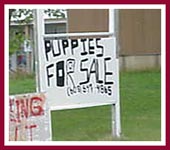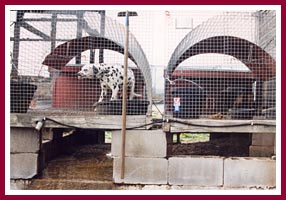 All
sources agree, however, that even the best "commercial breeder" is an
undesirable source for happy, healthy, well-socialized pets. It's a little
known fact that many, if not most, pet store kittens, birds, reptiles, and
other animals come from the same type of breeding facility. All
sources agree, however, that even the best "commercial breeder" is an
undesirable source for happy, healthy, well-socialized pets. It's a little
known fact that many, if not most, pet store kittens, birds, reptiles, and
other animals come from the same type of breeding facility.
The
problem with large commercial breeding facilities is, they are in the business
solely to make money. They "farm" pet animals as other livestock
breeders "farm" pigs, chickens, and cows (and, if they sell pets
wholesale, are governed by the same
agency). The goal is
profit, pure and simple.
Puppy
"farming" in the US started right after World War II (1946 or
thereabouts). When farmers' crops were failing, they needed to find another way
to make money, so they started raising puppies -- whether they knew anything
about taking care of dogs or not. Dogs were housed in whatever buildings were
available, including barns, sheds, chicken coops, and rabbit hutches! To many
"puppy farmers," the parent dogs are livestock, like their hogs or
chickens or cows, and the puppies are just another "cash crop."
Farming puppies
started in the midwest, but as the number of pet stores grew, so did the number
of "puppy farms" to keep up with the demand. Now, though there is no
way to know an exact number, there are probably tens of thousands of commercial
breeders all across the United States.
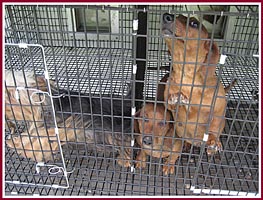 Why can't we
pinpoint an exact number? Basically there are two types of puppy mills: those
who sell wholesale to pet stores or laboratories, and those who sell directly
to the public through classified ads, over the internet, at flea markets, etc. Why can't we
pinpoint an exact number? Basically there are two types of puppy mills: those
who sell wholesale to pet stores or laboratories, and those who sell directly
to the public through classified ads, over the internet, at flea markets, etc.
The breeders who sell
wholesale to pet stores must be licensed by the United States Department of
Agriculture (USDA). The USDA does have minimum standards that the puppy farmers
are supposed to meet. You can read more about the USDA Animal Welfare Act (AWA)
in the USDA
Regulations section of our Existing Laws page. Here, you will also find
links to the USDA website if you would like to read the AWA in its entirety.
The "direct to
public" breeders far outnumber those who sell wholesale to pet stores, and
the numbers are growing all the time. With no licensing or regulation process.
there is no way of knowing how many breeders there are. Many former USDA
licensees are now selling direct to public -- no licensing fees, and, in most
states, no pesky regulations to be concerned about. (NOTE: as of September
2013,
Internet-based
Puppy Mills now Subject to USDA Regulation!)
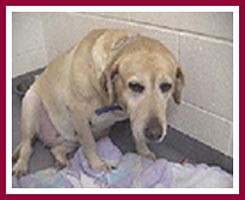 The "breeding
stock" — parents of the "cash crop" — will probably
never make it out of the mill, subsisting with poor quality food and shelter,
often in overcrowded, filthy, wire-bottomed cages; receiving minimal veterinary
care, if any; lacking socialization with humans; enduring active physical
abuse, and being killed or left to die when no longer "productive."
They will be bred as often as possible to increase profits, inbred (meaning
that the parent dogs are brother and sister, father and daughter, mother and
son, etc.); and sometimes bred indiscriminately. Altogether too frequently,
"defective" pups rejected by brokers, pet stores, or consumers, end
up at mill auctions as breeders. The "breeding
stock" — parents of the "cash crop" — will probably
never make it out of the mill, subsisting with poor quality food and shelter,
often in overcrowded, filthy, wire-bottomed cages; receiving minimal veterinary
care, if any; lacking socialization with humans; enduring active physical
abuse, and being killed or left to die when no longer "productive."
They will be bred as often as possible to increase profits, inbred (meaning
that the parent dogs are brother and sister, father and daughter, mother and
son, etc.); and sometimes bred indiscriminately. Altogether too frequently,
"defective" pups rejected by brokers, pet stores, or consumers, end
up at mill auctions as breeders.
Investigations
of some millers have even uncovered falsified lineage records (fake AKC/UKC
registrations). If this type of fraud is discovered, these facilities lose
their "registration privileges" with the AKC or UKC (see
What Does AKC/ UKC/ Breed Registration
Really Mean?), but some other registries have been invented by and for
breeders who have been barred from the legitimate breed registries just to
impress prospective puppy purchasers who haven't "done their
homework."
Because
of these indiscriminate breeding practices, pups may not actually be purebred,
or may be born with serious genetic disorders such as heart murmurs, hip
problems, skin problems, deafness, allergies, plates in the skull that don't
close properly, aggressive temperaments, or a host of other hereditary defects.
Some of these problems may show up as soon as the customer gets the new pup
home. Some may not become evident for several years.
 Puppies born in
commercial breeding facilities are also generally separated from their mother
and siblings weeks before they are ready. Studies have shown that pups are
taught important lessons in socialization, pack order, and discipline in the
first eight weeks of their lives. Puppies removed from their mothers' gentle
discipline and their siblings' play before the age of eight weeks may never
learn important lessons about getting along with other animals — including
non-dominant members of their new human families. And puppies whose only
contact with humans is as "merchandise" may never learn how to
respond to humans as friends and pack leaders. Puppies born in
commercial breeding facilities are also generally separated from their mother
and siblings weeks before they are ready. Studies have shown that pups are
taught important lessons in socialization, pack order, and discipline in the
first eight weeks of their lives. Puppies removed from their mothers' gentle
discipline and their siblings' play before the age of eight weeks may never
learn important lessons about getting along with other animals — including
non-dominant members of their new human families. And puppies whose only
contact with humans is as "merchandise" may never learn how to
respond to humans as friends and pack leaders.
For
the consumer who purchases a pet that started life with a commercial breeder,
these factors all too often result in the heartache of a new animal companion
facing severe physical and temperament problems and even early death. At the
very least, a pet store customer may take home a completely unsocialized —
and unsociable — puppy who may, within a matter of days, end up in a
shelter because of excessive nipping, biting, or refusal to bond with his/her
new family members.
Are
there good breeders? A most emphatic YES! Raising sound, healthy, well
socialized puppies is difficult work with some very specific demands. Quality
breeders care about the animals they produce, and most say that if someone is
making money breeding puppies, that person is doing something wrong! (Please
see our Finding a Pet Responsibly section
for tips on selecting a quality breeder and
Breeders With Pride:
Responsible Breeders Speak Out to see how some breeders feel about puppy
mills.)
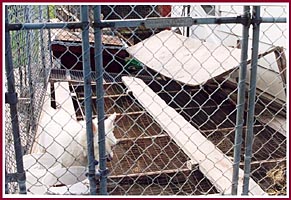 It is the opinion of
the Wisconsin Puppy Mill Project that puppy millers and back yard breeders
should not be called "breeders." They do not deserve the title.
Regardless of whether the facility is a large, sprawling commercial endeavor or
a few crates in someone's barn or backyard, whether they sell to brokers/pet
stores or direct to the public, Puppy Millers, Back Yard Breeders (BYB), and
pet brokers are PET PROFITEERS. They don't care about the
animals, they care about M-O-N-E-Y. They use and abuse animals for profit. It is the opinion of
the Wisconsin Puppy Mill Project that puppy millers and back yard breeders
should not be called "breeders." They do not deserve the title.
Regardless of whether the facility is a large, sprawling commercial endeavor or
a few crates in someone's barn or backyard, whether they sell to brokers/pet
stores or direct to the public, Puppy Millers, Back Yard Breeders (BYB), and
pet brokers are PET PROFITEERS. They don't care about the
animals, they care about M-O-N-E-Y. They use and abuse animals for profit.
NOTE: In 2009, the Wisconsin State
Legislature unanimously passed Act 90, a law regulating dog breeders and
sellers in our state. Since Act 90/s.173.41, the WI Dog
Seller Program went into effect in June 2011, MANY Wisconsin breeders and
sellers have been regulated and have either given up the business OR have come
into compliance under ACT 90. If you have personally encountered any problems
with any Wisconsin dog seller, please see our How
To File a Complaint With the WI Department of Agriculture, Trade, and Consumer
Protection page.
For more
information on Puppy Mills, see our Puppy
Mill Links page and:
|

